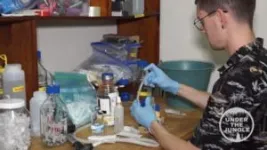(Press-News.org) A five-year, $5 million grant has been awarded by the National Cancer Institute (NCI) to the UTHealth Houston Institute for Implementation Science to support research and training in implementation science, with a focus on improving cancer control efforts in Mexico and Latin America.
The grant brings together researchers from UTHealth Houston, the Mexican National Institute of Public Health (INSP), the Mexican National Cancer Institute (INCan), and the University of California San Francisco (UCSF).
The grant will fund a new center, LISTOS for Cancer Control – Leveraging Implementation Science To Optimize Strategies for Cancer Control. The multiple principal investigators are María E. Fernández, PhD, vice president of population health and implementation science at UTHealth Houston and co-director of the Institute for Implementation Science; Martin Lajous, MD, DSc, faculty-researcher in the Center for Research in Population Health at INSP; and Karla Unger, MD, DSc, researcher in the Department of Epidemiology at INCan.
“This collaborative center aims to bridge the gap between evidence-based cancer prevention and control interventions and their real-world implementation,” said Fernández, the Lorne Bain Chair in Public Health and Medicine and professor in the Department of Health Promotion at UTHealth Houston School of Public Health. “It will also empower local professionals to use implementation science to enhance cancer control equity in Mexico and Latin America. We anticipate that the impact of this center will have a lasting effect on addressing these issues for years to come.”
LISTOS is one of the four centers selected by the NCI, part of the National Institutes of Health, under the Global Implementation Science for Equitable Cancer Control funding opportunity. Its primary mission is to bolster research capacity for implementation science in low- and middle-income countries and to facilitate research that identifies, comprehends, and overcomes obstacles to the adoption, adaptation, integration, dissemination, and sustainability of evidence-based cancer control interventions in these countries. Notably, LISTOS is the sole site dedicated to enhancing cancer control in the Latin American and Caribbean region.
Researchers will tackle significant cancer-related disparities by designing and testing new implementation strategies that are culturally relevant and fit the local context. Additionally, they will advance the field of implementation science in Latin America by providing training, mentorship, and other engaging activities to foster the next generation of implementation science leaders.
The initial phase of the LISTOS Center will include two studies aimed at enhancing early cancer detection within health care systems. The findings from these studies will contribute to innovative strategies that support the long-term implementation of colorectal cancer screening and the integration of rapid breast cancer diagnosis.
“In low- and middle-income countries, there is much that can be done to improve cancer control, yet the translation of evidence-based interventions into real-world practice lags behind what we know works. Our research aims to enhance cancer control in the region, reducing the burden of breast cancer and bolstering prevention and early detection of colorectal cancer,” Lajous said.
The goal of the colorectal cancer screening project is to adapt evidence-based interventions (patient education, patient reminders, and patient navigation), design implementation strategies to deliver these interventions, and evaluate the effectiveness, cost-effectiveness, and implementation outcomes. This project will take place in Mexico’s publicly funded health system for people with social security. The breast cancer research project seeks to develop and test implementation strategies designed to improve integrated care for rapid breast cancer diagnosis across various levels of the health care system, particularly for women presenting with breast symptoms in primary care settings. This project will be implemented within Mexico’s public health system accessible to the uninsured population.
“LISTOS will allow us to partner with local health systems to develop laboratories for innovation in cancer screening and early diagnosis and demonstrate both clinical and implementation outcomes that can be replicated nationally in Mexico,” said Michael Potter, MD, with UCSF, who is co-lead investigator of the colorectal screening study and a member of the LISTOS Executive Committee.
The LISTOS Center is also working with Leticia Torres Ibarra, DSc, with INSP; and Olga Martínez, MD, MPH, of the Mexican Institute of Social Security on a pilot project to study implementation of an ongoing program to improve human papilloma virus testing among women working in factories and hotels.
“Due to a highly segmented health care model and insufficient evidence on effective implementation strategies, populations in low- to middle-income countries are disproportionately impacted by cancer compared to those in higher-income countries. Our center and the studies we conduct will help address these issues and contribute to the science of implementation in these countries that can be applied to many other health issues,” Unger said.
The NIH funding is under grant U54CA284109.
Media Inquiries: 713-500-3030
A five-year, $5 million grant has been awarded by the National Cancer Institute (NCI) to the UTHealth Houston Institute for Implementation Science to support research and training in implementation science, with a focus on improving cancer control efforts in Mexico and Latin America.
The grant brings together researchers from UTHealth Houston, the Mexican National Institute of Public Health (INSP), the Mexican National Cancer Institute (INCan), and the University of California San Francisco (UCSF).
The grant will fund a new center, LISTOS for Cancer Control – Leveraging Implementation Science To Optimize Strategies for Cancer Control. The multiple principal investigators are María E. Fernández, PhD, vice president of population health and implementation science at UTHealth Houston and co-director of the Institute for Implementation Science; Martin Lajous, MD, DSc, faculty-researcher in the Center for Research in Population Health at INSP; and Karla Unger, MD, DSc, researcher in the Department of Epidemiology at INCan.
“This collaborative center aims to bridge the gap between evidence-based cancer prevention and control interventions and their real-world implementation,” said Fernández, the Lorne Bain Chair in Public Health and Medicine and professor in the Department of Health Promotion at UTHealth Houston School of Public Health. “It will also empower local professionals to use implementation science to enhance cancer control equity in Mexico and Latin America. We anticipate that the impact of this center will have a lasting effect on addressing these issues for years to come.”
LISTOS is one of the four centers selected by the NCI, part of the National Institutes of Health, under the Global Implementation Science for Equitable Cancer Control funding opportunity. Its primary mission is to bolster research capacity for implementation science in low- and middle-income countries and to facilitate research that identifies, comprehends, and overcomes obstacles to the adoption, adaptation, integration, dissemination, and sustainability of evidence-based cancer control interventions in these countries. Notably, LISTOS is the sole site dedicated to enhancing cancer control in the Latin American and Caribbean region.
Researchers will tackle significant cancer-related disparities by designing and testing new implementation strategies that are culturally relevant and fit the local context. Additionally, they will advance the field of implementation science in Latin America by providing training, mentorship, and other engaging activities to foster the next generation of implementation science leaders.
The initial phase of the LISTOS Center will include two studies aimed at enhancing early cancer detection within health care systems. The findings from these studies will contribute to innovative strategies that support the long-term implementation of colorectal cancer screening and the integration of rapid breast cancer diagnosis.
“In low- and middle-income countries, there is much that can be done to improve cancer control, yet the translation of evidence-based interventions into real-world practice lags behind what we know works. Our research aims to enhance cancer control in the region, reducing the burden of breast cancer and bolstering prevention and early detection of colorectal cancer,” Lajous said.
The goal of the colorectal cancer screening project is to adapt evidence-based interventions (patient education, patient reminders, and patient navigation), design implementation strategies to deliver these interventions, and evaluate the effectiveness, cost-effectiveness, and implementation outcomes. This project will take place in Mexico’s publicly funded health system for people with social security. The breast cancer research project seeks to develop and test implementation strategies designed to improve integrated care for rapid breast cancer diagnosis across various levels of the health care system, particularly for women presenting with breast symptoms in primary care settings. This project will be implemented within Mexico’s public health system accessible to the uninsured population.
“LISTOS will allow us to partner with local health systems to develop laboratories for innovation in cancer screening and early diagnosis and demonstrate both clinical and implementation outcomes that can be replicated nationally in Mexico,” said Michael Potter, MD, with UCSF, who is co-lead investigator of the colorectal screening study and a member of the LISTOS Executive Committee.
The LISTOS Center is also working with Leticia Torres Ibarra, DSc, with INSP; and Olga Martínez, MD, MPH, of the Mexican Institute of Social Security on a pilot project to study implementation of an ongoing program to improve human papilloma virus testing among women working in factories and hotels.
“Due to a highly segmented health care model and insufficient evidence on effective implementation strategies, populations in low- to middle-income countries are disproportionately impacted by cancer compared to those in higher-income countries. Our center and the studies we conduct will help address these issues and contribute to the science of implementation in these countries that can be applied to many other health issues,” Unger said.
The NIH funding is under grant U54CA284109.
Media Inquiries: 713-500-3030
END
UTHealth Houston partners with Mexican organizations for $5 million NIH grant to improve implementation of cancer control interventions in Mexico and Latin America
2023-11-10
ELSE PRESS RELEASES FROM THIS DATE:
Yucatán’s underwater caves host diverse microbial communities
2023-11-10
Cave divers collected 78 water samples throughout the complex web of underwater caves
Researchers found the cave system’s microbiome is distinct from the nearby sea
Microbial communities vary between cave systems forming distinct “neighborhoods”
EVANSTON, Ill. — With help from an experienced underwater cave-diving team, Northwestern University researchers have constructed the most complete map to date of the microbial communities living in the submerged labyrinths beneath Mexico’s Yucatán Peninsula.
Although previous researchers have collected water and microbial samples from the ...
A catalyst for change: New research aims to design atomically efficient and selective catalysts
2023-11-10
Most of us understand that electrical engineering and mechanical engineering play a key role in running our washing machines or our computers. But did you know that more than 80 percent of the products we use every day, such as fertilizers, cosmetics, fragrances, rubber and more, require some sort of chemical catalyst while being manufactured?
Catalysts are like turbochargers for chemical reactions. Until now, the process of designing a catalyst for chemical reactions has been mostly trial ...
Study finds tapering TNF inhibitors increases flares, lowers boolean remission rates for RA patients in remission
2023-11-10
ATLANTA — New research at ACR Convergence 2023, the American College of Rheumatology’s (ACR) annual meeting, found that rheumatoid arthritis (RA) patients in sustained remission who stopped TNF inhibitors (TNFi) had significantly more flares and lower Boolean 2.0 remission rates compared with those who continued treatment. Boolean 2.0 is a revised definition for evaluating disease activity in RA that classifies more patients as achieving remission than Boolean 1.0. It is endorsed by the American College of Rheumatology and the European Alliance for Associations in Rheumatology (EULAR) (Abstract #L07).
As more RA patients ...
Study shows stem cell transplant significantly improves outcomes in refractory juvenile systemic sclerosis
2023-11-10
ATLANTA — New research at ACR Convergence 2023, the American College of Rheumatology’s (ACR) annual meeting, shows that patients with refractory juvenile systemic sclerosis improved significantly on nearly all measures for two years following autologous stem cell transplant (Abstract #L06).
Juvenile-onset systemic sclerosis (jSSc), also called scleroderma, is a disfiguring autoimmune disorder marked by hardening of the skin and internal organs, including the digestive tract, lungs, musculoskeletal system, kidneys and heart. The psychological and physical effects of the disease persist into adulthood, and many patients have a shortened lifespan. Effective ...
Adolescent and young adult sex workers more likely to experience muscle dysmorphia
2023-11-10
Using data from over 900 participants in a large, diverse, and national sample of Canadian adolescents and young adults from the Canadian Study of Adolescent Health Behaviors, a new study published in the journal Sexual Health researchers found significant associations between sex work and muscle dysmorphia.
Sex work, in its various forms, is highly stigmatized in Canadian society, and sex workers are often victims of harmful stereotypes. It is estimated that roughly 4% of Canadian adolescents engage in selling sex, and research has shown that those involved in sex work are more at risk to experience substance use ...
Proteins and Networks: Bonn neuroscientist receives 1.2 million dollars for research into psychiatric disorders
2023-11-10
Neurodegenerative diseases like Alzheimer’s and Parkinson’s can be associated to depression and anxiety. Dr. Sabine Krabbe, a neuroscientist at DZNE’s Bonn site, is receiving 1.2 million US dollars from the Chan Zuckerberg Initiative to understand the mechanisms involved in the onset of these syndromes. To this end, she aims to examine the function of the brain’s “emotion center” using new methodologies to examine the function of single cells in experimental mouse models. The study will run for four ...
Perceived interpersonal racism and incident stroke among U.S. Black women
2023-11-10
About The Study: Black women who reported experiences of interpersonal racism in situations involving employment, housing, and interactions with police appeared to have an increased risk of stroke, even after accounting for demographic and vascular risk factors, according to the results of this study including 48,000 Black women. These findings suggest that the high burden of racism experienced by Black U.S. women may contribute to racial disparities in stroke incidence.
Authors: Shanshan Sheehy, Sc.D., of Boston University, is the corresponding author.
To ...
mRNA SARS-CoV-2 vaccination before vs. during pregnancy and omicron infection among infants
2023-11-10
About The Study: Maternal mRNA vaccination was associated with a lower risk of Omicron SARS-CoV-2 infection among infants up to six months of age only if the vaccine was given during the antenatal period in this study of 7,292 infants in Singapore. These findings suggest that mRNA vaccination during pregnancy may be needed for lower risk of SARS-CoV-2 infection among newborns.
Authors: Orlanda Goh, M.B., B.S., M.P.H., of Singapore General Hospital in Singapore, and Chee Fu Yung, M.B.Ch.B., of KK Women’s and Children’s ...
How mega-floods can be predicted
2023-11-10
What can we expect in the worst-case scenario? In regions with a high risk of flooding, this is an important question: what extreme events should the protective measures be designed for? Often this is answered simply by looking at history: The worst flood events of the past decades or centuries are regarded as a realistic upper limit for what can be expected in the future.
However, this can be misleading, as so-called "mega-floods" have shown in recent years. Time and again, extreme flood events occur, extraordinary outliers that were not considered possible on the basis of local data. However, a major research project carried out under the leadership ...
The governance gap: Balancing innovation and ecological responsibility in a world at risk
2023-11-10
“The world isn’t doing terribly well in averting global ecological collapse,” says Dr Florian Rabitz, a researcher at Kaunas University of Technology (KTU), Lithuania, the author of a new monograph Transformative Novel Technologies and Global Environmental Governance recently published by Cambridge University Press.
Greenhouse gas emissions, species extinction, ecosystem degradation, chemical pollution, and more are threatening the Earth’s future. Despite decades of international agreements and countless high-level ...




